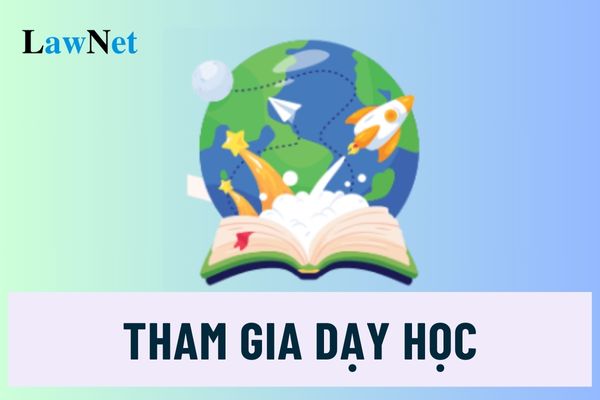Who is involved in teaching and monitoring universal education and literacy eradication in Vietnam?
Who is involved in teaching and monitoring universal education and literacy eradication in Vietnam?
Universal education is the process of organizing educational activities so that every citizen within a certain age has the opportunity to study and achieve a certain level of education as required by law. (Based on Article 5 Education Law 2019)
According to Article 22 Decree 20/2014/ND-CP, the regulations on persons participating in teaching and monitoring universal education and literacy eradication in Vietnam are as follows:
Persons participating in teaching and monitoring universal education and literacy eradication
1. Teachers of preschool education establishments, general education, continuous education, vocational education, and other educational establishments.
2. Individuals who meet the conditions as specified by the Education Law and the Law on amendments and supplements to certain provisions of the Education Law.
3. In special cases, other individuals may be mobilized to participate in teaching for illiteracy eradication.
4. Preschool education establishments, general education, and continuous education establishments assign persons to monitor the universal education and illiteracy eradication work in their assigned areas.
Currently, there are 4 groups of subjects participating in teaching and monitoring universal education and literacy eradication, including:
- Teachers of educational establishments;
- Individuals who meet the conditions as specified by the Education Law 2019.
- Other individuals participating in teaching for illiteracy eradication (mobilized only in special cases);
- In assigned areas, preschool education establishments, general education, and continuous education establishments assign persons to monitor the universal education and illiteracy eradication work.

Who is involved in teaching and monitoring universal education and literacy eradication in Vietnam? (Image from the Internet)
What are regulations on facilities and teaching equipment for universal education and literacy eradication in Vietnam?
According to Article 23 Decree 20/2014/ND-CP, the regulations on facilities and teaching equipment for universal education and literacy eradication in Vietnam are as follows:
- The facilities involved in implementing universal education must have sufficient facilities and minimum teaching equipment as prescribed to organize educational activities under the universal education program.
- Educational establishments, community learning centers, agencies, and organizations shall use their own facilities to organize literacy eradication.
- Encouragement for political-social organizations, other organizations, and individuals to provide material conditions for implementing universal education and literacy eradication.
What are the policies for teachers and other issues related to the work of universal education and literacy eradication in Vietnam?
Based on the provisions of Clause 6, Article 5 Circular 17/2022/TT-BTC, the regulations on spending for literacy eradication and universal education policies are as follows:
- Expenditures for investigation and survey activities serving literacy eradication and universal education in preschool, primary, and lower secondary education (hereinafter referred to as universal education):
Implemented according to the provisions of Circular 109/2016/TT-BTC;
- Students of literacy eradication classes supported with learning materials by the state:
Depending on the actual situation of the locality, the provincial People's Committee approves the list of names of learning materials, and the number of materials supported under the scope of learning materials support for middle school as prescribed in Clause 6, Article 2 Joint Circular 109/2009/TTLT-BTC-BGDDT Ministry of Finance, Ministry of Education and Training guiding certain financial policies for students of boarding schools and ethnic preparatory universities;
- The state budget supports expenses for night class lighting, the acquisition of record books for tracking learning processes, shared textbooks (for night universal education and literacy eradication classes), and expenditures for propagating and mobilizing illiterate and re-illiterate individuals to literacy eradication classes:
Specific expenditure levels are determined by the provincial People's Council based on the local budget's balancing capacity, and the scale and duration of literacy eradication classes;
- Salary payments for teachers who are on the payroll teaching literacy eradication and preventing re-illiteracy classes within the professional duties of public education and training establishments: paid according to the provisions of Decree 204/2004/ND-CP of the Government of Vietnam on salary policies for officials and public employees and the armed forces.
In cases where teaching hours exceed the standard teaching hours, payments are made according to the provisions of Joint Circular 07/2013/TTLT-BGDDT-BNV-BTC Ministry of Education and Training, Ministry of Home Affairs, Ministry of Finance guiding the implementation of policies on overtime pay for teachers in public educational establishments;
- Labor payments for those who volunteer to teach literacy eradication classes (including teachers on the payroll of public education training establishments and non-payroll individuals who meet the standards and ability to teach):
Labor payment levels based on local minimum wages and ensuring the correlation with the salary levels of on-the-payroll teachers with equivalent training qualifications, teaching seniority, and teaching the same level of education, as prescribed by the current state policies on salary policies for officials and public employees and armed forces;
In the case of mobilizing volunteers to participate in teaching literacy eradication classes:
State budget provides support for food, accommodation, and travel expenses for these subjects according to the policies on travel expenses prescribed in Circular 40/2017/TT-BTC.

